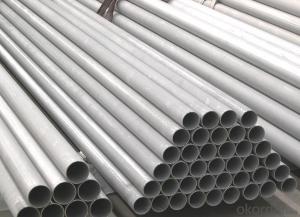Austenitic Seamless Steel Pipe 316L 00Cr17Ni14Mo2
- Loading Port:
- Tianjin
- Payment Terms:
- TT OR LC
- Min Order Qty:
- 100 m.t.
- Supply Capability:
- 3000 m.t./month
OKorder Service Pledge
OKorder Financial Service
You Might Also Like
Product Description:
1、Structure of Austenitic Seamless Steel Pipe 316L Description:
Stainless Steel 316L Pipe is also known as austenitic stainless steel alloy. It offers tremendously high resistance to pitting and crevice corrosion in the chloride conditions. With its austenitic structure it imparts extremely high hardness even at low cryogenic temperature ranges. Stainless Steel 316L Pipe offers stress to rupture, large tensile strength and creeping resistance at the elevated temperature ranges.
2、Main Features of the Austenitic Seamless Steel Pipe 316L :
• High manufacturing accuracy
• High strength
• Small inertia resistance
• Excellent weldability
• Highly tough
•Tremendous resistance to corrosion in the various media and oxidation
3、Austenitic Seamless Steel Pipe 316L Images:
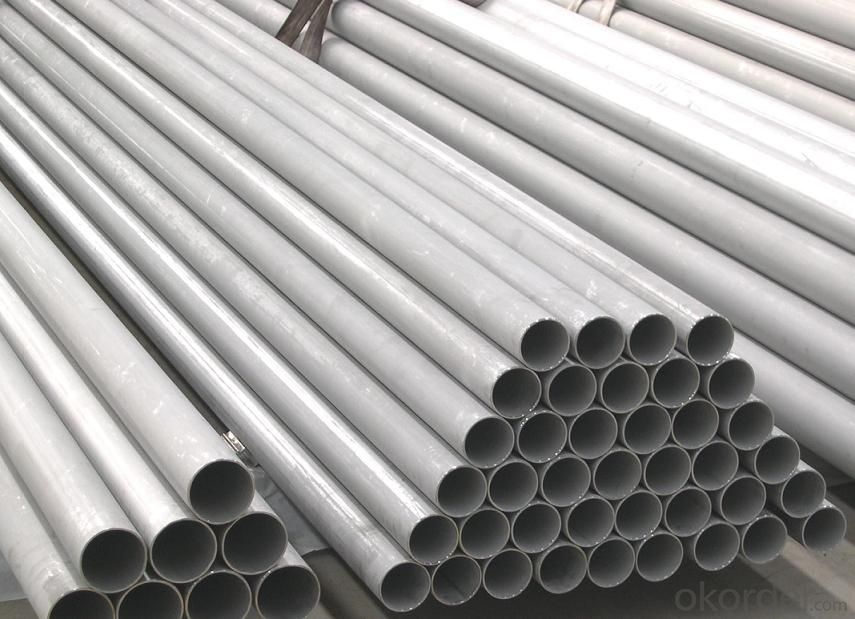
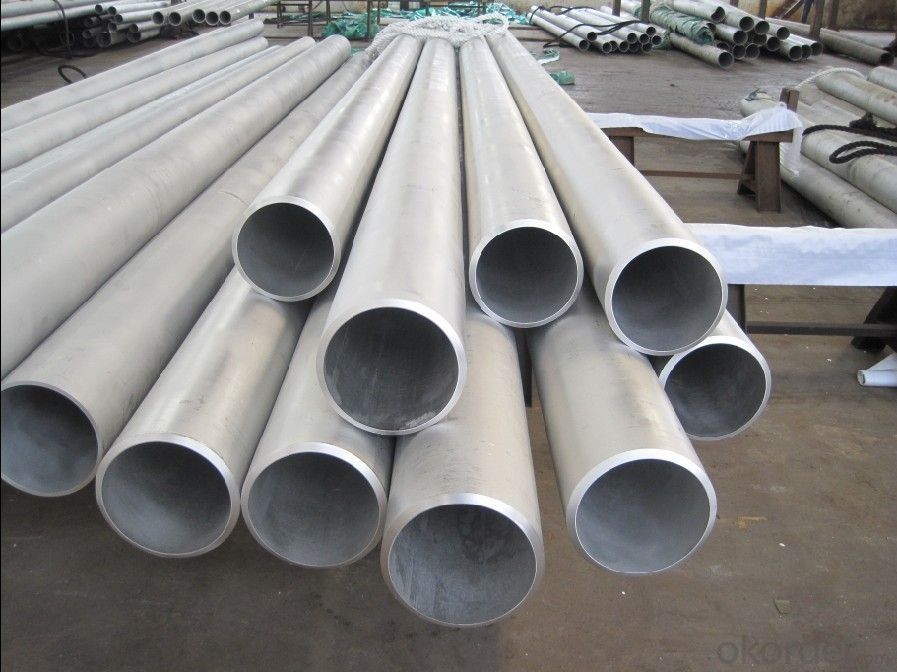
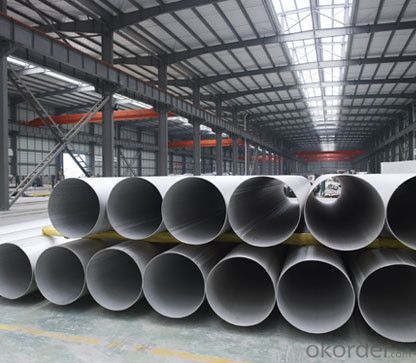
4、Austenitic Seamless Steel Pipe 316L Specification:
Product name: AISI stainless steel pipe/tube
Materials: 304, 304L, 310S, 316, 316L, 325, 273, 219 and 168
Thickness: 1, 2, 2.5, 3, 3.5, 4, 5, 6 and 8mm
Outer diameter: 6-480mm
Length: as required
Treatment: cold and hot rolled
Applications: construction upholstery, and industry instruments, such as fencing, railing,safe doors/windows, gate fittings, inside staircases, balcony balustrades, furniture, sanitary wares and kitchen wares
Standards: GB, AISI, ASTM, DIN and JIS
Sureface: 2B, BA and designer finishes
Price terms: FOB, CIF, CFR and EXW
Delivery:10-15 days after received the deposit or as quantity request.
Chemical Composition | C | Mn | P | S |
<=0.0< span="">3 | <=2.00< span=""> | <=0.0< span="">35 | <=0.03< span=""> | |
Si | Cr | N | Ni | |
<=1.00< span=""> | 16-18 | NO | 12-15 |
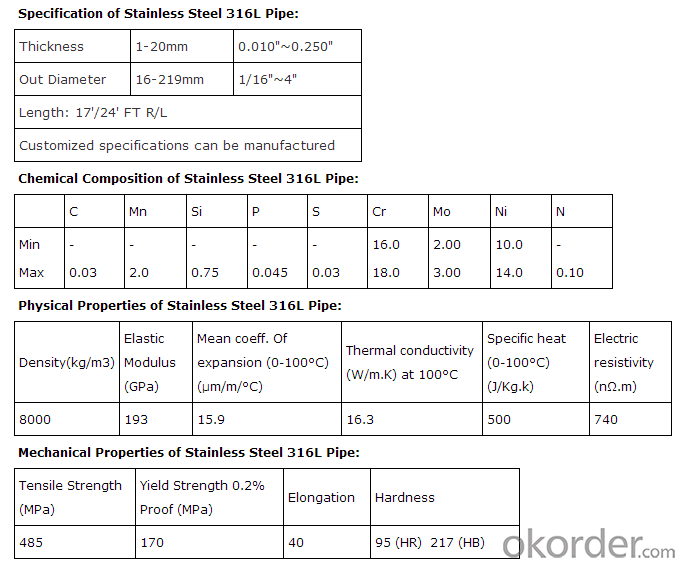
5、FAQ of Austenitic Seamless Steel Pipe 316L :
①How is the quality of your products?
Our products are manufactured strictly according to national and internaional standard, and we take a test
on every pipe before delivered out. If you want see our quality certifications and all kinds of testing report, please just ask us for it.
Guaranteed: If products’ quality don’t accord to discription as we give or the promise before you place order, we promise 100% refund.
②How about price?
Yes, we are factory and be able to give you lowest price below market one, and we have a policy that “ for saving time and absolutely honest business attitude, we quote as lowest as possible for any customer, and discount can be given according to quantity”,if you like bargain and factory price is not low enough as you think, just don’t waste your time.Please trust the quotation we would give you, it is professional one.
③Why should you chose us?
Chose happens because of quality, then price, We can give you both.Additionally, we can also offer professional products inquiry, products knowledge train(for agents), smooth goods delivery, exellent customer solution proposals.Our service formula: good quality+good price+good service=customer’s trust
SGS test is available, customer inspection before shipping is welcome, third party inspection is no problem.
Any question, pls feel free to contact us !
- Q:How are steel pipes insulated to prevent noise transmission?
- Steel pipes are typically insulated to prevent noise transmission by using materials such as fiberglass or mineral wool wraps. These insulating materials are wrapped around the pipes, creating a barrier that absorbs and dampens sound waves, reducing noise transmission. Additionally, acoustic lagging or jackets can also be applied to further reduce noise and vibration.
- Q:Can steel pipes be used for transporting gases?
- Yes, steel pipes can be used for transporting gases. Steel pipes are commonly used for various applications including the transportation of gases due to their durability, high tensile strength, and resistance to corrosion. They are often preferred for transporting gases over other materials due to their ability to withstand high pressure and temperature conditions.
- Q:What is the primary purpose of steel pipes?
- The primary purpose of steel pipes is to transport fluids and gases, such as water, oil, and natural gas, over long distances in a safe and efficient manner.
- Q:What's the difference between a rectangular tube and a rectangular steel tube?
- The classification of rectangular tube: steel pipe seamless steel pipe and welded steel pipe (tube) hot-rolled seamless tube, seamless tube, seamless tube, welded tube extrusion. The welded square pipe is divided into two parts:(a) according to the process of arc welding - resistance welding tube, square tube (high frequency and low frequency), welding square tube, welding square tube furnace (b) according to the weld - welded square tube, spiral welded pipe.
- Q:How are steel pipes insulated for thermal applications?
- Steel pipes are commonly insulated for thermal applications using various materials such as fiberglass, mineral wool, or foam insulation. These insulating materials are typically wrapped around the steel pipes to create a protective barrier that reduces heat transfer. Additionally, a vapor barrier may be installed to prevent moisture condensation. This insulation helps to maintain the desired temperature of the fluid or gas being transported through the pipes and prevents energy loss.
- Q:What is the thermal conductivity of steel pipes?
- The thermal conductivity of steel pipes can vary depending on the specific type of steel and its composition, but generally, steel has a relatively high thermal conductivity compared to other materials. It is typically around 50-60 W/m·K.
- Q:Are steel pipes suitable for use in coastal areas?
- Yes, steel pipes are suitable for use in coastal areas. Steel is known for its durability and resistance to corrosion, which makes it a reliable choice for withstanding the harsh conditions of coastal regions, including exposure to saltwater and high levels of humidity. Additionally, steel pipes can be coated or galvanized to provide extra protection against corrosion, ensuring their longevity and performance in coastal environments.
- Q:Where is a steel pipe casing usually used?
- Classification of casing: rigid casing, flexible waterproof sleeve, steel pipe sleeve and iron sheet bushing, etc..
- Q:How are steel pipes protected against rusting?
- Steel pipes are protected against rusting through a process called corrosion protection. There are several methods employed to prevent rust formation on steel pipes, including: 1. Coatings: One common method is applying various coatings to the surface of the steel pipes. These coatings act as a barrier, preventing oxygen and moisture from reaching the metal surface and initiating the rusting process. Coating options include epoxy, polyethylene, zinc, or even a combination of these materials. 2. Galvanization: Galvanizing steel pipes involves immersing them in a bath of molten zinc. This process creates a protective layer of zinc on the surface of the pipes which acts as a sacrificial barrier. If any small areas of the pipe surface are exposed, the zinc coating will corrode instead of the steel, providing ongoing protection against rust. 3. Cathodic Protection: This method utilizes an electrical current to protect the steel pipes. By connecting the pipes to a sacrificial anode, usually made of zinc or magnesium, the anode will corrode instead of the steel pipes when exposed to moisture and oxygen. This process is commonly used in underground or underwater applications. 4. VCI (Vapor Corrosion Inhibitor) Technology: VCI technology involves the use of chemical compounds that release a vapor that protects the steel pipes from rusting. These compounds form a thin layer on the surface of the pipes, inhibiting the corrosion process by neutralizing oxygen and moisture. 5. Regular Maintenance: In addition to the above methods, regular inspection and maintenance are crucial to prevent rust formation on steel pipes. This includes cleaning the pipes, removing any accumulated debris or corrosive substances, and repairing any damaged coatings or protective layers. Overall, these methods of corrosion protection effectively safeguard steel pipes from rusting, ensuring their longevity and durability in various industrial, commercial, and residential applications.
- Q:What is the impact of steel pipe size on flow rate and pressure?
- The steel pipe size has a significant impact on both the flow rate and pressure. A larger pipe size allows for higher flow rates by reducing the frictional losses, resulting in increased fluid velocity. This leads to higher pressure drops across the pipe due to the increased surface area exposed to the flowing fluid. Conversely, a smaller pipe size restricts the flow, causing higher pressure drops and lower flow rates. Therefore, selecting an appropriate pipe size is crucial to ensure optimal flow rates and pressure levels in a system.
1. Manufacturer Overview |
|
|---|---|
| Location | |
| Year Established | |
| Annual Output Value | |
| Main Markets | |
| Company Certifications | |
2. Manufacturer Certificates |
|
|---|---|
| a) Certification Name | |
| Range | |
| Reference | |
| Validity Period | |
3. Manufacturer Capability |
|
|---|---|
| a)Trade Capacity | |
| Nearest Port | |
| Export Percentage | |
| No.of Employees in Trade Department | |
| Language Spoken: | |
| b)Factory Information | |
| Factory Size: | |
| No. of Production Lines | |
| Contract Manufacturing | |
| Product Price Range | |
Send your message to us
Austenitic Seamless Steel Pipe 316L 00Cr17Ni14Mo2
- Loading Port:
- Tianjin
- Payment Terms:
- TT OR LC
- Min Order Qty:
- 100 m.t.
- Supply Capability:
- 3000 m.t./month
OKorder Service Pledge
OKorder Financial Service
Similar products
New products
Hot products
Related keywords
